Parcours Ronde wheelset review
This all-road wheelset has everything covered, from low weight to high compatibility to proven aerodynamics
- (opens in new tab)
- (opens in new tab)
- (opens in new tab)
- Sign up to our newsletter Newsletter
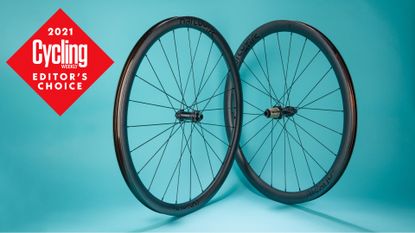
In the very competitive £1,000/$1,000 carbon wheelset category it's usually possible to spot at least one area where a model falls short, but not so with the Parcours Ronde. It has been meticulously designed by one of the leading thinkers in wheel design, it ticks all the aero, weight and compatibility boxes and its performance is flawless. The perfect upgrade wheel.
-
+
Low weight
-
+
Tested aerodynamics
-
+
Compatible with 25-50mm tyres
-
+
Excellent ride quality
-
+
Can handle terrains from tarmac to gravel
- -
Why you can trust Cycling Weekly Our expert reviewers spend hours testing and comparing products and services so you can choose the best for you. Find out more about how we test.

Taking its name and inspiration from the Ronde van Vlaanderen, aka the Tour of Flanders, the disc-only Parcours Ronde (£1,049) puts low weight, high versatility and proven aerodynamic performance into mixed-terrain riding.
Weighing a claimed 1,400g (our set weighed 1,417g with rim tape) and optimised around a 28mm tyre - though compatible with everything from 25mm up to 50mm - the Ronde is what the British brand describes as “an all-road wheelset ensuring high speeds on the asphalt, with confident and reliable performance when the going gets rough.”
Parcours Ronde: construction
Parcours founder Dov Tate, who is an Oxford engineering graduate, conducted a groundbreaking study into bicycle wheel aerodynamics with Dr Steve Faulkner at the sports engineering department of Nottingham Trent University, with the mid-depth 2020 Parcours Strade wheelset resulting from his findings.
Tate used marine anemometers fitted at the axles of front and rear wheels to measure wind speed and direction and found that since conditions are quite different: in a nutshell, the average yaw angle at the front wheel was consistently higher than at the rear since airflow at the rear was affected by the front of the bike and rider’s legs, feet and pedals.
Parcours used a blunt 49mm U-shaped rim with a 32mm external width at the front, and a sharper 54mm V-shaped rim with a width of 30.5mm at the back and it tested very fast against the competition.
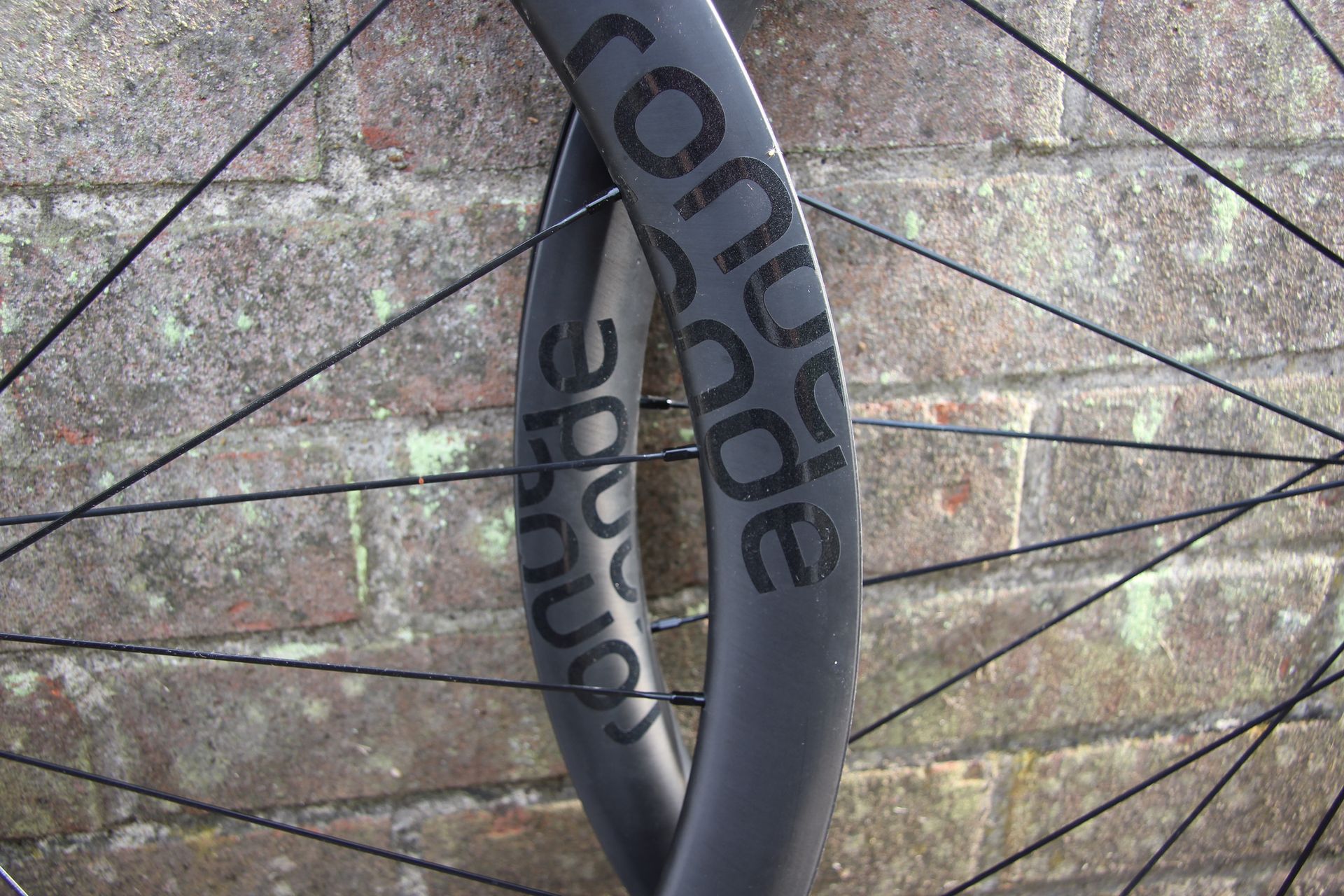
This same approach informed the development of the shallower and lighter (by around 120g) Ronde, which has a front rim that’s 35.6mm deep and 32.0mm wide and rear that’s 39.3mm deep and 30.5mm wide. Both have the same internal rim width of 22.5mm.
Tate says the Ronde has been tested in the wind tunnel against its competitors - namely the Zipp 303S and the Enve SES 3.4AR - and claims it sets a new benchmark for an all-road disc-brake wheelset. He published a white paper with its wind tunnel data here.
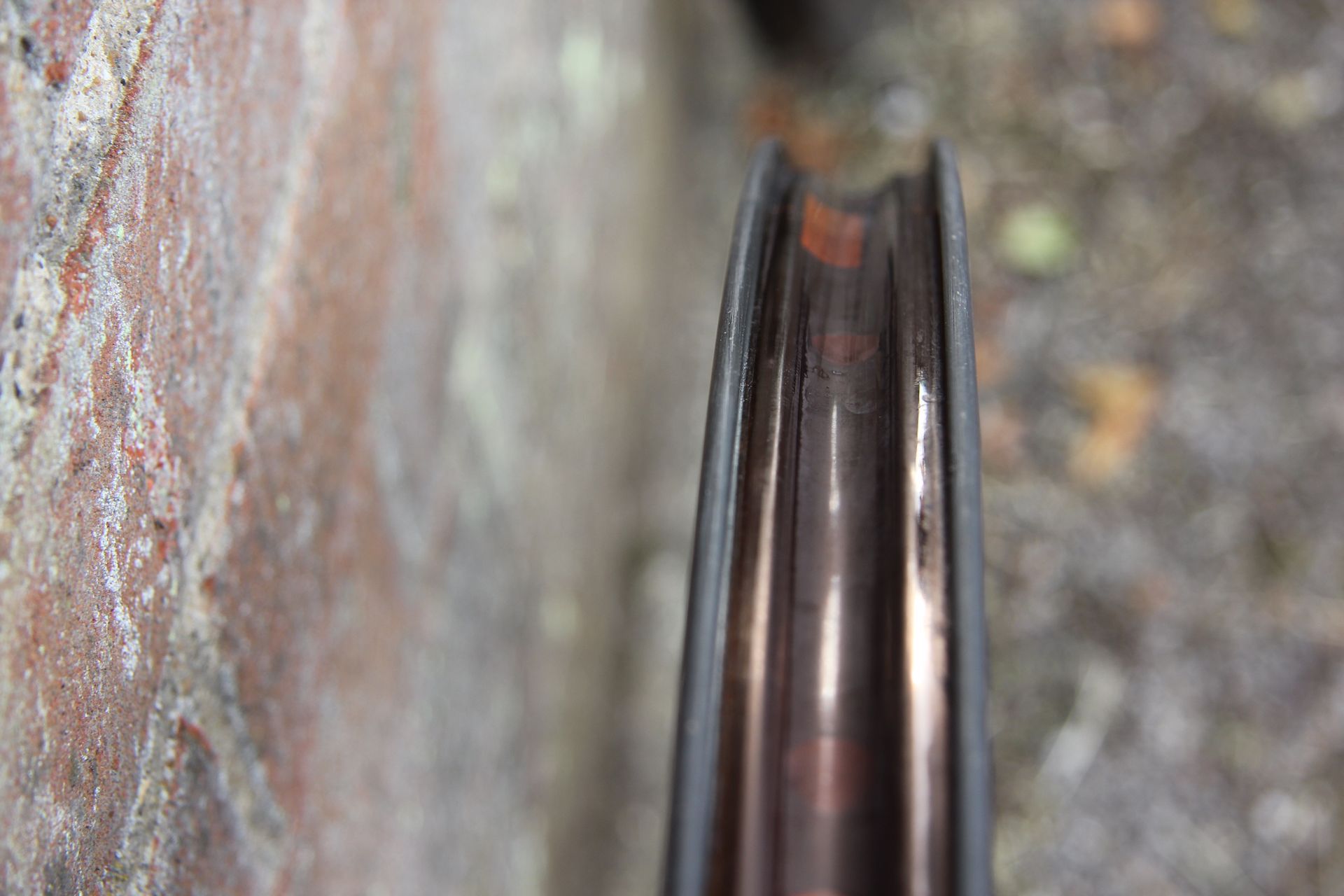
The rims are tubeless ready of course, but not hookless. Tate says he didn’t want users to be limited in their choice of tyre: most notably the Continental Grand Prix 5000 is not hookless compatible.
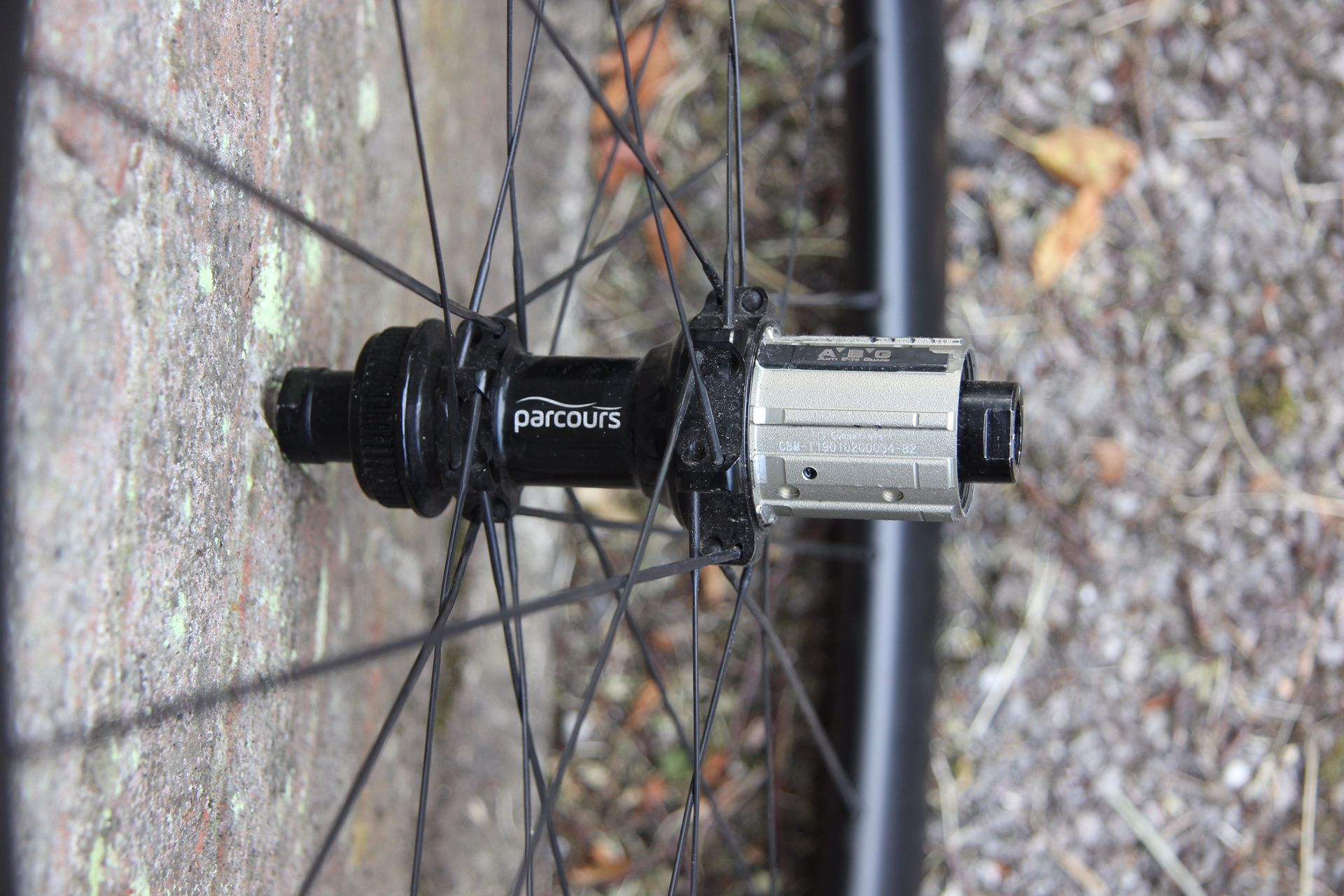
As for the Parcours-branded hubs, they are made from machined aluminium for 12mm thru-axles and run on EZO cartridge bearings. They use the Centerlock disc standard. There are 24 Sapim CX-Ray bladed straight-pull spokes front and rear, laced in a two-cross pattern.
The spoke nipples are exposed for easy truing but the Rondes arrived 100 per cent true and stayed that way.
Build quality is excellent - you can see from the pictures that this is a really premium looking wheelset.
Parcours Ronde: the ride
My first ride on these wheels was with Tate himself, a loop from his base at Cranleigh into the Surrey Hills. He had planned some grippy little climbs and gnarly descents to ensure I could properly put them through their paces. Hoe Lane, Barhatch and the one that goes up through the trees in the direction of Leith Hill out of Peaslake feature plenty of potholed, broken surfaces liberally sprinkled with gravel.
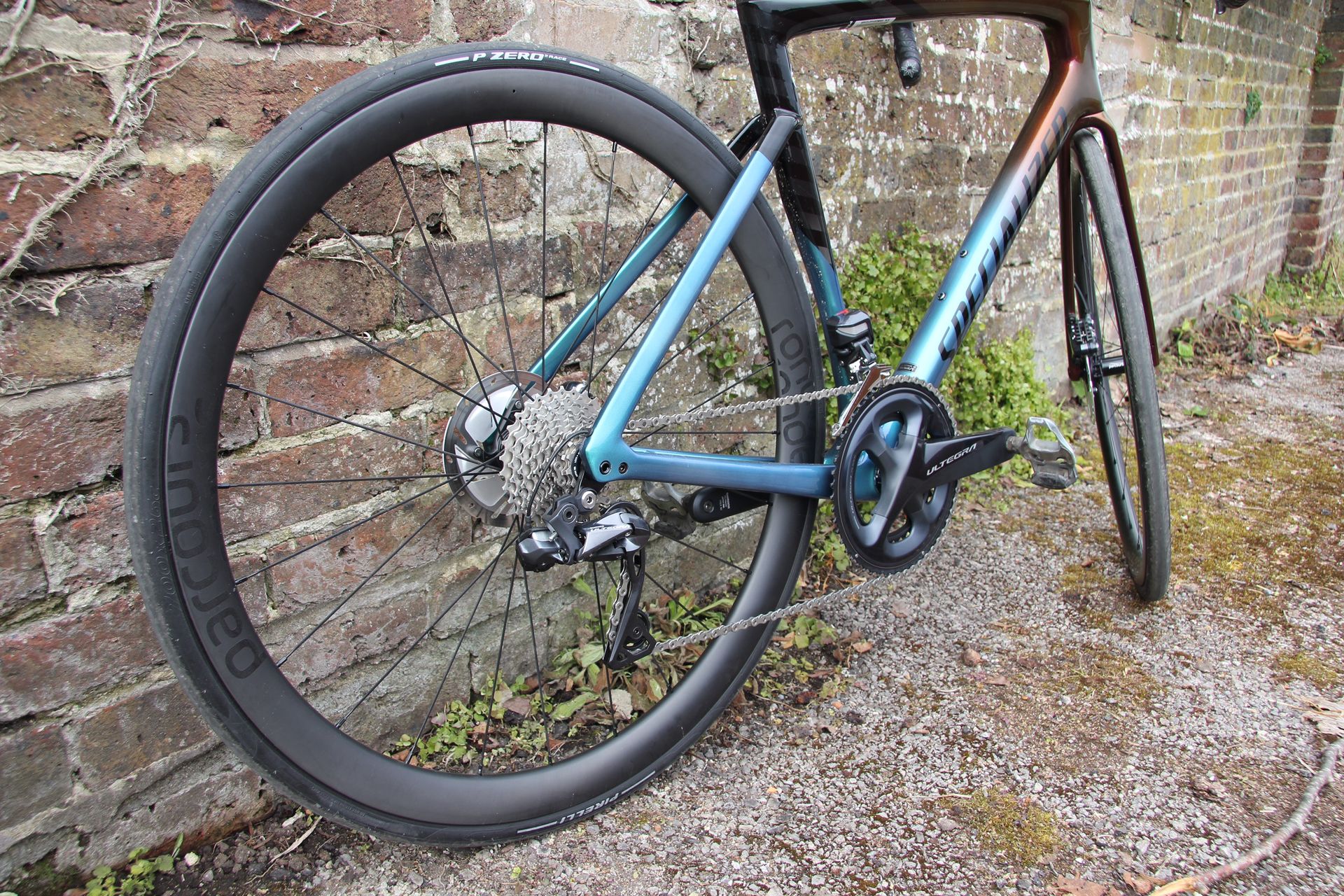
For these roads I set up the Rondes tube-type using the new Pirelli P Zero Race clinchers (26mm) and found it very straightforward to get the bead over the rim walls. They come with tubeless valves and rim tape, but for narrower tyres tubes are my preference.
The ease with which the tyres went on suggests that for tubeless setups you'll need a decent blast from a compressor to get them up onto the bead shelf.
The new Pirellis are designed for the latest wheels with wider internal rim widths like the Rondes and sat nicely flush. They measured 28.5mm on the rim.
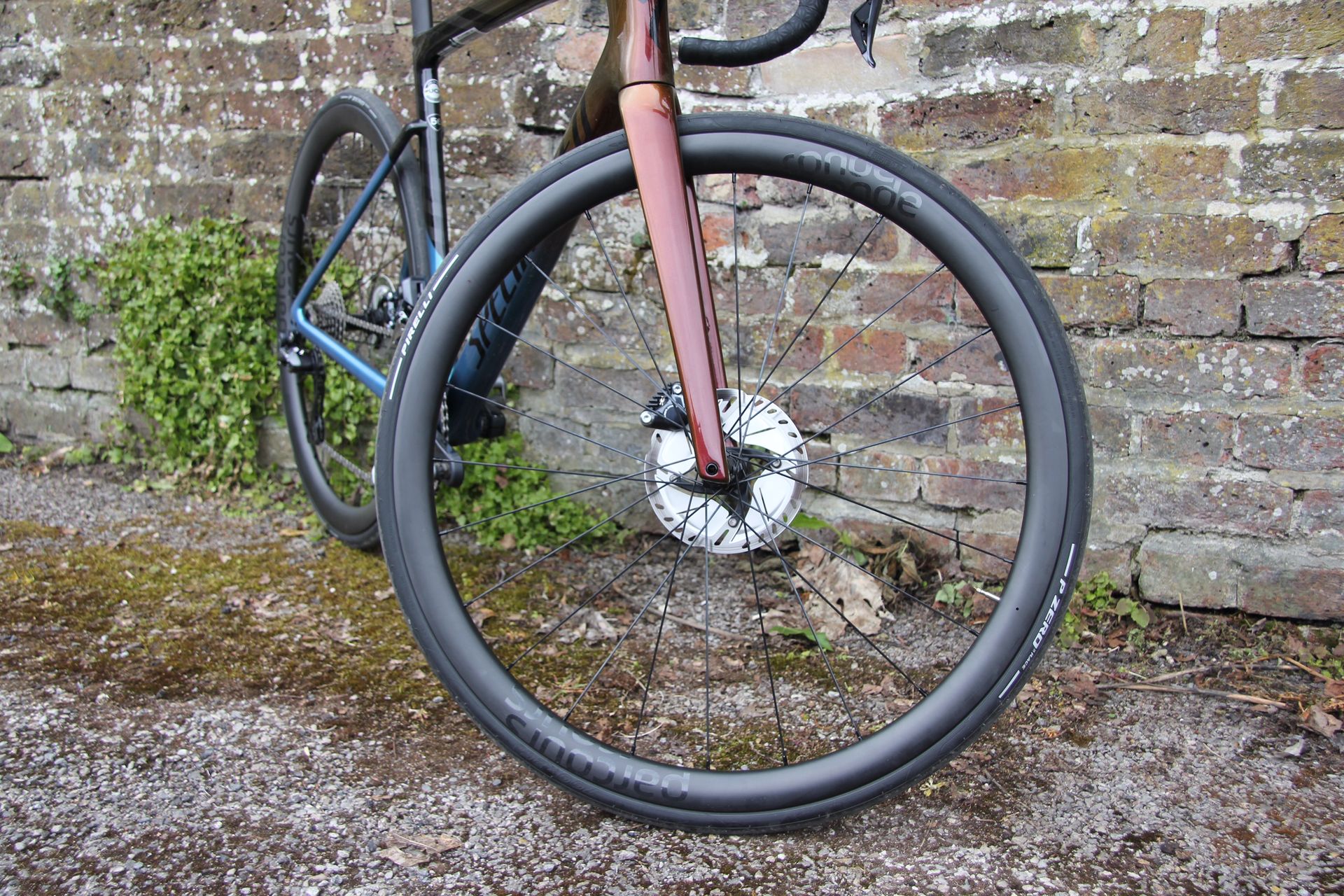
I ran them on a Specialized SL7 Tarmac Expert Di2, which comes with budget DT Swiss aluminium rims to bring it in at a particular price point. Although the SL7 is an awesome bike that’s great to ride even with cheap wheels, the Parcours Ronde wheels really brought it to life, back up to the level where it should be and of course sliced almost half a kilo off its weight.
On the first climb they felt so stiff, fast and light that I decided to get out of the saddle rather than change down, prompting Tate to announce he was about to get dropped. In reality I think he was just being nice, plus I had been deploying that old roadie trick of making him do all the talking.
Despite running the narrowest tyres possible - another old habit that dies hard, but at least this time they were at lower pressures than back in the day - I was also impressed by the Rondes' ability to damp some very rough surfaces on speedy descents leading to high cornering confidence. Some carbon wheels start to clatter alarmingly when you’re cornering on less-than-smooth tarmac but the Rondes felt always smooth but still supplying plenty of feedback.
I was able to test them with the other bikes in our £5K race bike head-to-head - Giant, Scott and BMC - and on some longer club runs and I’ve been unable to fault them.
Parcours’ own data shows that that the Rondes are not as aerodynamic as the deeper-rimmed Strades, and on the flat in a big gear going as fast as possible you don’t get that feeling of slicing through the air, so for a road-racing or fast chaingang wheel I would probably go for the Strade, where the aerodynamics are more important than the 120g of extra weight compared to the Ronde. But that’s the only scenario I can honestly think of where I wouldn’t choose the Ronde.
I used the word ‘sweetspot’ in my first ride report and that’s a word that sums up the Rondes nicely - they are aerodynamic, light, tough and compatible with a wide range of tyre sizes making them super capable on pretty much any surface this side of mountain biking.
Value and conclusion
The £1,000/$1,000 all-rounder carbon wheel pricepoint is particularly competitive at the moment. The Parcours Ronde wheelset at £1,049 is priced slightly higher than the Zipp 303S, probably the best known wheel in the category - but the Zipps are heavier at a claimed 1,540g. However, the Ronde's other competitor in the wind tunnel, the Enve SES 3.4AR, matches the Rondes' 1,400g weight but starts at £2,800/$2,250.
Hunt’s 48 Limitless Aero Disc (£1,099) claims to be the fastest wheel in the world under 50mm deep but they’re about 200g heavier than the Parcours Ronde, while Specialized has more recently joined in with the new Roval C38 that costs £1,150/$1,000 and weighs a claimed 1,560g.
So it looks as though the Parcours Ronde is hitting a sweetspot with its price as well as its weight and performance. In the £1K all-road carbon wheel category everything is pointing towards it being the one to beat.
| Parcours Ronde £1,049 | Header Cell - Column 1 |
|---|---|
| Rim depth | 35.6mm (front) / 39.3mm (rear) |
| Max rim width | 32.0mm (front) / 30.5mm (rear) |
| Internal rim width | 22.5mm |
| Weight | 1,417g weighed with rim strips (790 front 627 front / 790g rear) |
| Spokes | Sapim CX-Ray 24 front / 24 rear |
| Lacing pattern | 2 cross front / 2 cross rear |
| Hubs | Parcours Disc Centrelock |

Thank you for reading 10 articles this month* Join now for unlimited access
Enjoy your first month for just £1 / $1 / €1
*Read 5 free articles per month without a subscription

Join now for unlimited access
Try first month for just £1 / $1 / €1
Simon Smythe is Cycling Weekly's senior tech writer and has been in various roles at CW since 2003. His first job was as a sub editor following an MA in online journalism. In his cycling career Simon has mostly focused on time trialling with a national medal, a few open wins and his club's 30-mile record in his palmares. These days he spends most of his time testing road bikes, or on a tandem doing the school run with his younger son.
-
 Closing the gap: David Gaudu emerges from Paris-Nice more confident than ever before
Closing the gap: David Gaudu emerges from Paris-Nice more confident than ever beforeThe Groupama-FDJ rider finished second overall at the Race to the Sun, but gained more than just the result
By Adam Becket • Published
-
 Goodbye lime: We need to talk about the Tour de France green jersey
Goodbye lime: We need to talk about the Tour de France green jerseyThere's change afoot at ASO's French races, with the combativity colour also undergoing a revamp
By Adam Becket • Published
-
 Andrei Kivilev remembered 20 years on from his death at Paris-Nice
Andrei Kivilev remembered 20 years on from his death at Paris-NiceKazakh rider’s death during 2003 edition led to helmets being made obligatory in racing
By Peter Cossins • Published


